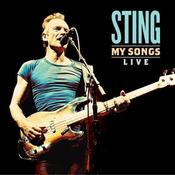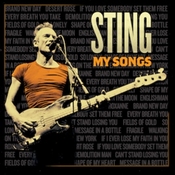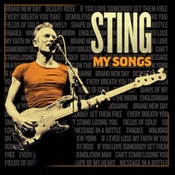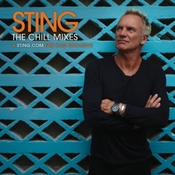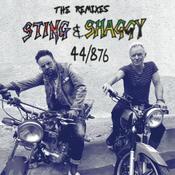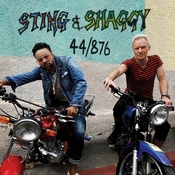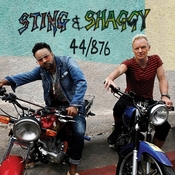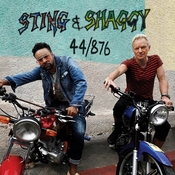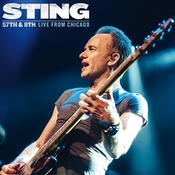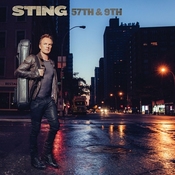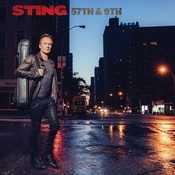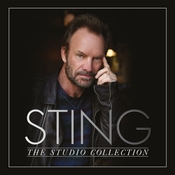LAST EXIT: First From Last Exit
Backgrounder
This was a demo only cassette for promo purposes and which was sold at gigs.
A very rough guide to Last Exit...
This story starts in autumn 1971, when the then Gordon Sumner enrolled at Northern Counties Teacher Training College in Newcastle. It was here that he first met and befriended Gerry Richardson who was in the year ahead. Gerry saw him playing, and although not initially impressed, his interest picked up when he learned that Gordon knew a drummer, Paul Elliot, who had access to both a van and a PA, and it didn't take long before the three got together with a female singer to form 'Earthrise' and started rehearsing at the Wheatsheaf pub.
Gerry was involved with local bands including the 'Phoenix Trad Jazz Band' where he filled in on bass, and when he left the band his place was taken by Gordon, who shortly afterwards metamorphised into Sting! Sting went on to dabble in a variety of local band such as the River City Jazzmen and Newcastle Big Band between 1971 and 1974. Meantime, Gerry finished his stint at Teacher Training College and left for Bristol but found himself back in Newcastle within a year, just as Sting finished his spell at college. At, this point, October 1974, they decide to put together a band with John Hedley and Ronnie 'Armour' Pearson, and at Gerry's prompting take their name from Hubert Selby's cult book, the bleak "Last Exit From Brooklyn".
The 4 October 1974, found Gerry (keyboards & vocals), John (guitar), Sting (electric bass & vocals) and Ronnie (drums) rehearsing as unit for the first time. Individually, they had reputations and this undoubtedly helped secure their first gig less than two weeks after their first rehearsal, at the Gosforth Hotel on 17 October 1974. The band earned the princely sum of £1.70 each (just over a dollar).
Two months later, Last Exit, augmented by Derek Lunn on drums and Iwan Williams on keyboards, had secured the job of band, when the "Rock Nativity" opened at Newcastle University Theatre on 18 December 1974. Rock Nativity of course, is where Sting met Frances Tomelty, his first wife who had the starring role of Mary in the production.
During 1975 the band became a regular fixture on the North East circuit, building up a solid base of loyal fans. They would play a regular rotation at Newcastle University Theatre on Sunday lunch times and at Gosforth Hotel on Wednesday evenings, but also took the road south to the North Yorkshire moors playing pubs, and fellow ex-Newcastle Big Band member Andy Hudson helped them pick up support slots with bands visiting Newcastle.
At one point they auditioned unsuccessfully for Tyne Tees Television's music show "Geordie Scene", but had better success in the Melody Maker's Annual rock contest, where they came a creditable third out of thirty entrants. Sadly, the cut-off point for progression was second place, which wasn't bad considering that John didn't show up, and the band had to improvise their slot!
Inevitably, the urge to get into a recording studio was growing. The band - mainly Gerry and Sting - were starting to write their own material, and so the Spring of 1975 found them become regular visitors to Impulse Sound Studios' in Wallsend to record demo tracks. Notable dates included 23 February 1975, when the band recorded two takes of Gerry's track 'I Got It Made', 7 March 1975 when 'I'm On This Train' was recorded and 3 April 1975 when Sting's first track, 'Oh My God' (or 'Oh My Gawd' according to the recording sheet) was put onto tape. A full list of what was recorded and when is very difficult to pin down, with several tracks not even having a name allocated to them, and frustratingly, the term "Instrumental" is used repeatedly. As John Hedley recalls, "Things like dates and names were of minor importance compared with knowing which knob to twiddle on the desk".
Dave Wood, who owned Impulse Sound Studios had known Sting for many years, indeed Sting used to deliver his milk! Dave recalls helping pick up Sting's bass gear, amp/speakers/guitar etc from his flat in Heaton when Last Exit were playing gigs and coming in for studio sessions. Throughout 1975 and the early part of 1976, Dave recorded quite an array of material with Last Exit, including in 1975: 'We Got Something' (Gerry), 'Truth Kills Everybody' (Sting), 'Whispering Voices Slower version' (Gerry), 'Evensong' (Gerry), 'I Can't Say' (Sting), 'Savage Beast' (Sting), 'Whispering Voices 3.43 minute version' (Gerry), 'Sunshine Of My Life', 'Three Card Rag', 'Put On Your Wings And Fly' - (Cover version) and a number of instrumental tracks including the eponymously titled Last Exit. Several tracks, such as 'I Can't Say' and 'Put On Your Wings and Fly' were recorded more than once.
'Put On Your Wings and Fly' is particularly interesting, as Dave's father brought a record back from a holiday in the Caribbean, and Dave specifically asked the band to record it. Indeed Dave paid them a session fee for the performing the track, but sadly it has never been released. Dave knew what he liked and also tried to persuade the band to record a version of Bill Wither's 'Friend of Mine' after hearing a great Sting vocal on the song at one of their gigs in Gosforth, but the band had a preference for writing and recording their own material and declined.
During 1975, Last Exit were starting pick up some positive reviews, especially from a local journalist, Phil Sutcliffe who grew a soft spot for the band. In May, Sutcliffe reported in "Sounds" that Last Exit's music had "this week Newcastle, next week the world" written all over it. And in July, the same paper reported that,
"'Exit' combined experience and sophistication with a naked, funky excitement that makes the Average White Band look like a set of old grannies - and they're only regular outlets are to a few dozen people in a couple of pubs. Anyway they set out to blast the Pacific Eardrum off the stand and when I had to leave to review Billy Cobham they were playing so fast that Tyneside's own Brendan Foster would never have caught them."
The band secured a booking at the 1975 San Sebastian festival, and the thought of the trip spurred the band into yet more recording activity. John Hedley, reflected that "All of the tracks on the "album": First from Last Exit, were recorded as demos prior to June 1975. With the trip to San Sebastian on the horizon, it was decided, at short notice, to cobble these tracks together and produce an "album" to raise a few pesetas when we got to Spain. This is why the inner sleeve looks like it was done with a John Bull Printing Outfit on a cereal packet."
The pink, simply typed inlay card may not look very professional, but 'First from Last Exit' (WUD/C/101) is one of the rarest collectibles in the Sting world, containing some of Sting's first material, some of which would later feature, reworked, on several Police albums. The nine track collection, produced by Dave Wood, has been heard by few people and is considered one of the rarest 'trades' around, and features the original Last Exit members along with one track by semi-occasional guest guitarist, Terry Ellis, who was to later replace John Hedley full time. The track listing for this tape was 'We Got Something' (Sting), 'Truth Kills' (Sting), 'Whispering Voices' (Gerry), 'Carrion Prince' (Sting), 'Savage Beast' (Sting), 'I Got It Made' (Gerry), 'I'm On This Train' (Sting), 'Oh My God' (Sting), 'A Bit Of Peace' (instrumental - Terry).
So with their 100 demo cassettes ready to be (hopefully) snapped up by eager Basque's, Last Exit (joined by Cormac Loane) arrived in Spain on 16 July. Despite Sting upsetting the road crew to such a degree that they stormed off back to England, the band won the award for best amateur band (the award sits on Sting's mantelpiece to this day), and were taken under the wing of a local Basque road crew. In return for accommodation and food, the band played another festival on 2 August, and with some additional club dates hastily arranged in Bilbao, the band secured enough money to book places on the ferry back home to Britain.
Even at this time Last Exit were considering a move south to help secure the all important record deal, but during the autumn of 1975, John Hedley's enthusiasm was waning and he left the band after a show at the Gosforth Hotel on 15 October. The seeds of punk were being sown, and he - correctly, as it turned out - suspected that even with a move to London, the band would still struggle to build a following. He was content getting his satisfaction from simply playing his guitar and improving his technique. He told Outlandos, "My ambition was to make a decent living playing the guitar, and keep myself happy by always trying to get better. Well I've been pro since 1969. I still practise two hours a day when I can, and the only other person I know who does that is Sting."
On 25 October "Sounds" were back in Newcastle reporting on Last Exit again.
"They put up Dynamiting' warnings round the University Theatre these Sunday lunchtimes as Last Exit, the Steve Brown Band and the New Tyneside Jazz Orchestra play in rotation (no, not on a revolving stage). It's all music you just pray won't die on the wind, unrecorded, like so much really fine rock played by obscure bands around the country. Last Exit were explosive, even without their regular guitarist John Hedley, and gaining a passing Lol Coxhill. They tore through numbers like 'Hymn of the Seventh Galaxy' and Last Exit with incredible ferocity. Last Exit are a year old now and if those record companies ever look north it can't be long before they make their first entrance into the big time."
The following night, 26 October, Mike Oldfield was in Newcastle for a live performance of his Tubular Bells work. In Mike's line-up was none other than Andy Summers, and by a twist of synchronicity, the evening support slot was provided by Last Exit. Although Sting and Andy did not reportedly meet, Andy has since admitted that he wasn't particularly impressed by the 'Exit'.
November 1975 saw the band release their only piece of vinyl, a 7" single of two Gerry Richardson tracks featuring Sting vocals, 'Whispering Voices' and 'Evensong', on the Wudwink label. Naturally, the single was recorded by Dave Wood back at Impulse. Expect to pay at least £40 for a copy of this single should you be lucky enough to come across a copy.
Late 1975 it was Rock Opera time again. The previous year's "Rock Nativity" had laid the foundations¬Ö it was now time for "Hellfire", the Bible set to rock music! A local press review by Peter Mortimer captures the feel of this ambitious show, which once again features the music of Last Exit.
'Hellfire' Comes A Bit Late' - Redemption comes late in the day for"Hellfire" the rock opera at Newcastle's University Theatre. Presumably not too late for the audience, for the reception was enthusiastic. Memories are sometimes short, and though I'll willingly acknowledge the gutsy muscle injected into the finale, there are some serious shortcomings in the main body of the work. The theme is The Bible - all of it, the cast a mixture of professional actors and children, and Paul Todd's music is played by Tyneside's most exciting group, Last Exit. Inevitably, biblical rock has a derivative feel about it these days. What is left to do? Probably nothing, but here the ambitious plan is to whizz us through from the creation until Christ finally descends from the cross and sees Lucifer off. A big task and in the overlong first half especially, one that overstretches the company. God (Peter Rutherford) stands on high surveying all while Lucifer (Geoffrey Burridge) pops up and down from his dominions to do his naughties. If Last Exit's musicianship maintains a high standard, Ian Forrest's direction at times looks lack-lustre: the lyrics are self consciously modern ("No way baby!" is a repetitious phrase of God's), and we're left unsure as to whether this is lampooning or a real attempt at spiritual uplifting. Some necessary cutting, and the piece's vitality may improve greatly.
The New Year saw Last Exit quickly back in their usual routine with a noon date at the University Theatre on 4 January and at the Gosforth Hotel the following evening. Further sessions at Impulse were completed which resulted in new recordings of Sting's 'Carrion Prince', Gerry's 'Whispering Voices', a cover of Neil Young's 'Don't Let It Bring You Down', and another Sting track, 'Everyday's Just The Same'.
Everyday may have seemed the same, but the band were continuing to garner support, as the Sunday Sun reported on 29 February 1976:
"You could do worse than take a trip down to the Gosforth Hotel on a Wednesday night. If you can push your way into the packed upstairs room you will find the weekly regulars, Last Exit one of the brightest hopes of all the North's up and coming bands. I am a jazz hater, so I was almost put off going by their phoney jazz-rock label. In fact, I enjoyed the varied and imaginative music, which defies any label except "great".
On May 1st Sting and Frances married at Our Lady and St Oswin's Chapel, Tynemouth. In July, Sting handed in his notice, left his teaching job and wrote 'Don't Give Up Your Daytime Job' an amusing but soul destroying tale of hawking your wares around A&R men. Also around this time he took a swift trip on the P&O Cruise Liner in a job that Ronnie had lined up. Meanwhile that summer Frances made appointments in London taking the demo tape around various A&R men, whilst leaving Sting to fend for himself back in Newcastle. Eventually Virgin showed interest and promised to watch the band.
That Autumn the band supported fellow Geordie, Alan Price, at Newcastle City Hall. Virgin kept their promise and both Carol Wilson and Richard Branson of Virgin Music Publishing came to check the band out. Virgin were not impressed but Carol Wilson was persistent and although the band didn't get a recording deal a publishing deal was offered to Sting - one he accepted and later came to regret, and which resulted in a court battle to win back the rights to all his early material.
Carol remained enthusiastic though and she arranged for the band to come to London for an A&R gig at Dingwalls supporting Isaac Guillory, and to spend three days at Pathways studio with Virgin picking up the tab. This whole episode was reported in an excellent Sounds article, "Making It" by Phil Sutcliffe which was eventually published in January 1977. Estimates vary on the actual number of tracks recorded at Pathway, but the consensus is around 13 tracks including 'I'm On This Train', 'Savage Beast', 'Night In The Grand Hotel', 'I Can't Say', 'Give And Take', and 'Getting It On'.
Carol Wilson aside, the Virgin crew were less than ecstatic. There was a new sound that was becoming all the rage - raw, loud, in your face. Punk had arrived. Virgin were in a quandary - Last Exit were serious musicians who knew their licks, could read music, had a reportedly huge catalogue of material and cover versions (around 70 songs) with which they could entertain their fans. They were being labelled with a jazz-rock tag, when the record companies in London were falling over themselves to sign any old bunch of snotty nosed kids with ripped jeans who were decorated with safety pins. Returning to Newcastle, they slipped back into their usual routine of regular gigs at local venues in a confused state of mind. Could they make it in London? Would they want to make it London?
Just before Christmas 1976, Curved Air played Newcastle City Hall, and afterwards Stewart Copeland asked local journalist Phil Sutcliffe to take him to see a local band. A long time champion of the band, Sutcliffe took Copeland to see Last Exit at St. Mary's Teacher Training College. Stewart took an instant dislike to the band - later he and Ronnie would conduct an acrimonious slanging match in the letters page of Melody Maker - but he saw enough of the singer to be impressed, and the first seeds of what would become The Police were sown.
The Newcastle Journal reported that it was... "Not surprising to see one of the local bands, Last Exit packing their bags and seeking fame and fortune in London. The rock group have gone as far as they can in the North with their vaguely jazz funk approach. In London they are likely to be truly appreciated. The gigs are there and so are the deals. Already there are murmurings of likely recording contracts. I caught the band making their last appearance at the Gosforth Hotel after playing twice weekly there for two years."
And so on 6 January 1977, Last Exit played their farewell to Newcastle gig at the University Theatre, and headed once for London again.
Accounts vary, but it appears that Sting's aim to initially to move to London with the intention of getting together with Stewart Copeland. He was a contact certainly, but at this time, it appears he was still committed to Last Exit, and wanted to give London another try, perhaps more so than other members of the band. Sting went to London to met his publisher and to sort out the move of Last Exit from Newcastle to London. Sting didn't know that many people in London but having met Stewart only weeks before they arranged to meet up. Stewart was determined to make a good impression, he had his heart set on Sting joining him in a new band, and within a few days the two of them started rehearsing with Henri Padovani. Determined to make it in London, Sting and his family made the break and moved to London late in January 1977.
Last Exit followed Sting down to London and in January and February secured a few dates in the capital, including the Red Cow, and supported Plummett Airlines at the Nashville, and Kevin Coyne at the LSE. So for a short period, Sting was rehearsing with both Stewart and Henri, getting ready to record Fall Out, and also playing gigs with Last Exit. Sting recalled a review of that Kevin Coyne show, "Karl Dallas reviewed the show in Melody Maker. I remember there was this sentence about us in his review. I was thrilled. I remember thinking, 'At last we're a tiny microcosm in the rock business, at last we've been recognised.'" What Dallas had said was,
"...And an interesting Northern band called Last Exit, with a decidedly listenable brand of melodic jazz rock, all topped off nicely with the irrepressible Kevin Coyne."
Sadly, Last Exit failed to get the reviews and attention they needed to retain their enthusiasm, and at the end of February 1977, they decided to disband after another show at the Red Cow in Hammersmith. On 1 March 1977, the Police played their first paying gig in that hotbed of punk, The Stowaway Club in Monmouth, Wales, pocketed a fiver for their troubles, and the rest as they say, is history.
Sting.com/Dave & Wendy, Spring 2001
Research for this article came from various books, articles and reviews with the main sources being Phil Sutcliffe's Sounds articles, Phil Sutcliffe and Hugh Fielder's 'L'Historia Bandido', Ian Copeland's'Wild Thing', and Miles' 'Police - A Visual Documentary'. The input and generosity of Dave Wood and John Hedley in contributing, reading and correcting parts of the text has been invaluable as has the Outlandos archives.


